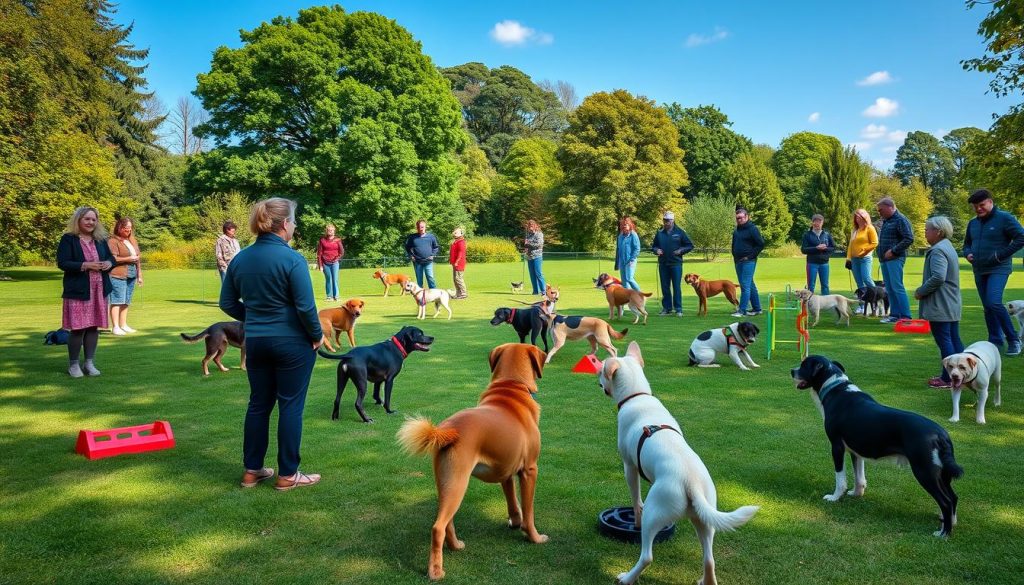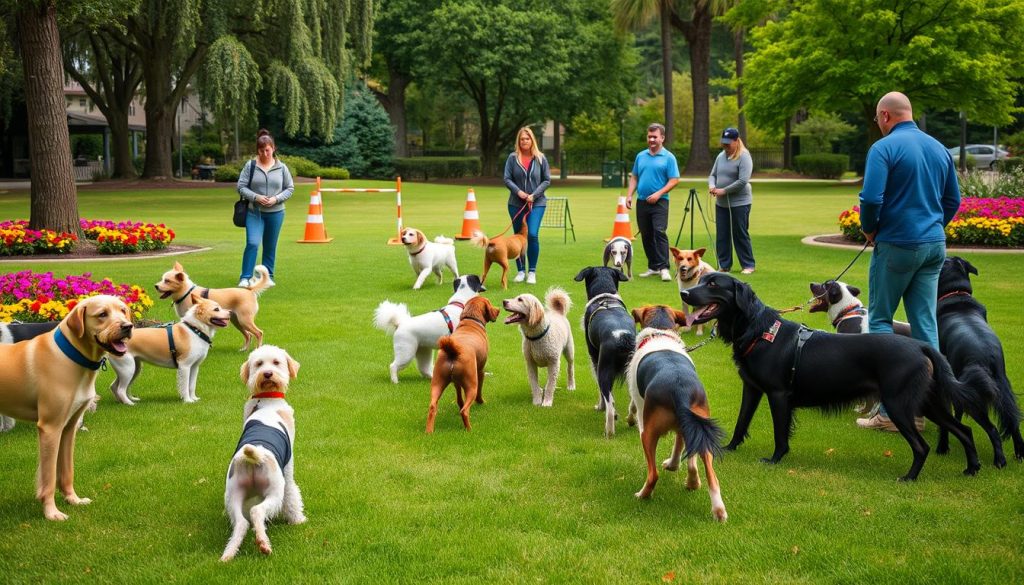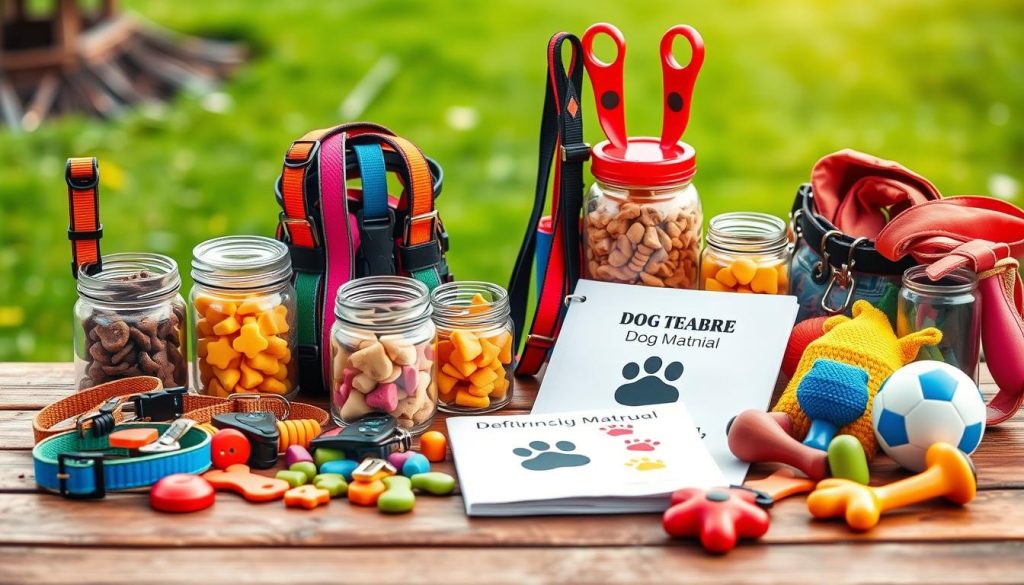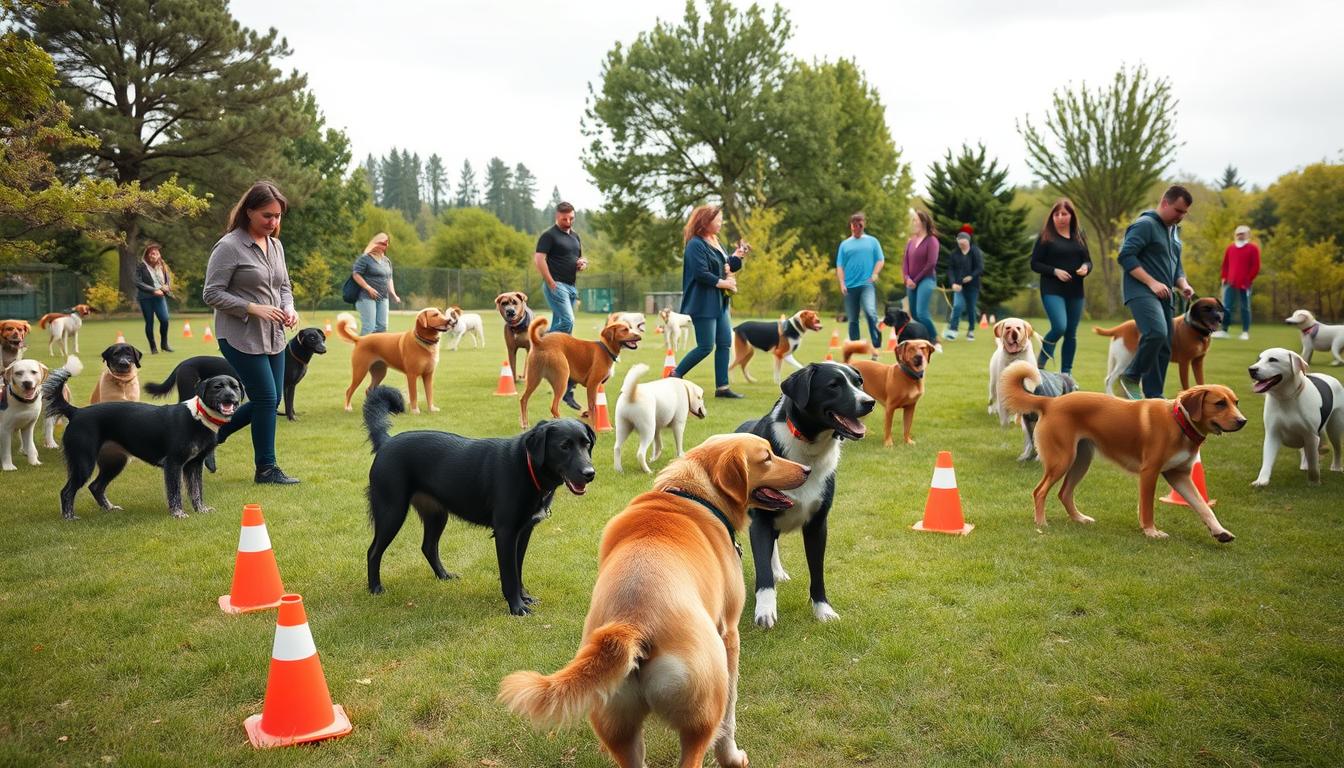As a devoted dog owner, I know how crucial it is to give our dogs the right training. This helps them grow and thrive. Whether your dog has behavioral issues or you want to bond more, the right classes can help. In this guide, I’ll show you where to find great dog training near you. This will help you and your dog have a better relationship.
Dog training is more than just teaching commands. It’s about solving behavioral problems and building a strong bond. By joining the right classes, you’ll learn how to handle issues like barking, jumping, or anxiety. You’ll also learn how to communicate better with your dog, building a lifelong connection.
Whether you’re new to dog ownership or have years of experience, the right training can change your relationship. You’ll learn essential commands and how to handle complex issues. These classes will give you the skills to raise a well-behaved, happy, and confident dog. Let’s start this journey together and find the best dog training classes near you.
Understanding the Importance of Dog Behavioral Training
Proper dog behavioral training is key for solving many issues. This includes problems like excessive barking, jumping, aggression, and separation anxiety. By signing up for a good training program, you can fix these issues. Plus, it makes your bond with your dog stronger.
Addressing Common Behavioral Issues
Dog training can solve many common pet problems. These include:
- Excessive barking or howling
- Jumping up on people
- Chewing on furniture or other household items
- Pulling on the leash during walks
- Aggression towards people or other animals
- Separation anxiety when left alone
Building a Strong Human-Canine Bond
Dog training does more than fix bad behaviors. It also strengthens your bond with your dog. Training together builds trust, communication, and understanding. This creates a lifelong connection.
Regular training sessions are great for positive reinforcement. They improve your dog’s well-being and how well they listen to you.
| Benefits of Dog Training | Improved Behavior | Stronger Bonding |
|---|---|---|
| Reduces common behavior problems | Teaches obedience and manners | Enhances communication and trust |
| Helps with behavior modification | Promotes better socialization | Fosters a deeper emotional connection |
| Provides mental stimulation | Increases confidence and discipline | Strengthens the human-canine bond |
Choosing the Right Dog Behavioral Training Classes
Choosing the right dog training classes is crucial. It affects your dog’s training success and your bond with them. It’s important to look at different training methods and philosophies to find the best fit.
Evaluating Training Methods and Philosophies
Understanding the training methods and philosophies is key. Look for classes that match your preferences and your dog’s needs. Here are some factors to consider:
- Positive reinforcement: Choose programs that reward good behavior, not punish bad ones.
- Customized curriculum: Make sure the training is tailored to your dog’s challenges and learning style.
- Certified trainers: Opt for classes led by experienced, certified trainers who know canine behavior well.
- Class size and environment: Consider smaller groups and a calm setting for more attention and less distraction.
By carefully evaluating different training methods and philosophies, you can choose the right class. This choice will help you and your dog have a successful and rewarding training experience.
| Training Method | Description | Pros | Cons |
|---|---|---|---|
| Positive Reinforcement | Focuses on rewarding desired behaviors | Builds trust, strengthens bond, and motivates learning | Requires patience and consistent application |
| Balanced Training | Combines positive reinforcement with mild corrections | Addresses both desirable and undesirable behaviors | Requires skilled trainers to avoid over-correcting |
| Dominance-Based Training | Emphasizes the handler’s authority and the dog’s submission | Can quickly modify certain behaviors | May create fear, stress, and damage the human-canine bond |

Dog Behavioral Training Classes: A Comprehensive Guide
Exploring dog behavioral training can feel daunting. But don’t worry! This guide will help you understand the different training programs. You’ll find the right one for your dog.
There are many training options, like group classes and private sessions. Group classes are great for socializing and learning basic obedience. They’re a fun way for your dog to interact with others.
Private sessions, however, offer a personalized approach. They’re perfect for tackling specific issues like leash pulling or aggression. A private trainer will create a plan just for your dog.
Some programs focus on special skills, like agility or scent work. Agility training boosts your dog’s coordination and confidence. Scent work classes help them use their sense of smell.
It’s important to choose a reputable trainer who uses positive methods. This ensures a positive learning experience for both you and your dog.
Knowing about different training classes helps you pick the best one. You’ll bond and grow with your dog on this exciting journey!

Preparing for Your Dog’s Training Sessions
Getting ready for your dog’s training is key to a good experience. You’ll need the right treats and the right collar or harness. These things help a lot in your dog’s learning.
Essential Supplies and Equipment
Here are some things you should get for your dog’s training:
- High-value training treats: Pick small treats like cooked chicken, cheese, or freeze-dried meat. They should be irresistible to your dog.
- Training collar or harness: Get a collar or harness that fits well. It helps you control your dog and keeps them focused.
- Clicker (optional): A clicker can help you teach your dog new things by marking good behavior.
- Toys: Bring your dog’s favorite toys. They can be rewards or part of the training.
- Water and a portable bowl: Make sure your dog stays hydrated, especially when it’s hot.
- Training manual or notes: Use any training guides or your own notes. They help you follow the training plan.
With the right dog training supplies and equipment, you’re ready for preparing for dog training classes. This will help your dog learn and grow.
| Item | Purpose |
|---|---|
| High-value training treats | Reinforce desired behaviors during the training session |
| Training collar or harness | Provide better control and allow your dog to focus during the session |
| Clicker (optional) | Use as a tool to reinforce desired behaviors during the training process |
| Toys | Incorporate into the training exercises or use as rewards |
| Water and portable bowl | Keep your pup hydrated during the training sessions |
| Training manual or notes | Refer to any materials provided by the instructor or your own notes |

Finding Local Dog Behavioral Training Experts
Finding experienced dog trainers in your area is crucial for your dog’s growth. I’ll share tips on how to find top trainers in your community. We’ll explore online directories and personal recommendations to find the right professionals. They can help with your dog’s behavior and strengthen your bond.
Searching online is a great way to find local dog trainers. Use sites like Yelp, Google, and the Association of Professional Dog Trainers (APDT). They help you find trainers near you, read reviews, and compare services. This is a good start to find a trainer that fits your needs and your dog’s training.
Don’t forget about word-of-mouth recommendations. Ask people in your community about their experiences with dog behavioral training experts. Talking to other pet owners, vets, or pet stores can lead you to successful trainers. They are known for their great service and results.

